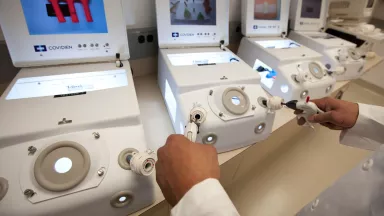General Orthopedics: General Questions
A general orthopedic surgeon can treat the large majority of traumatic and non-traumatic conditions of the musculoskeletal system. The most common of these include neck and back pain, hip pain, shoulder pain, knee pain, sprains, strains, and fractures that do not require surgery.
An appointment with a general orthopedic surgeon is recommended when your condition persists for a prolonged period of time, significantly compromises function, or feels different than a similar injury in the past. Severe injuries should be evaluated right away to ensure appropriate and timely management of the injury.
Any relevant medical information, including diagnostic reports and images, will help us better evaluate your condition. If you have these available as digital files, please bring them with you to your first visit.
Additionally, please bring the following:
- Insurance card
- Photo ID
- Outside medical records
- Outside slides with pathology reports
- Referring physician contact information
- Primary care provider contact information
- Pharmacy contact information
Please plan to arrive at least 15 minutes before your scheduled appointment to allow for the registration and insurance verification process. We understand staying on schedule is important to our patients, and your early arrival helps ensure that we can see all our patients in the timeliest manner possible.
Insurance policies differ from patient to patient, and coverage will depend on both the procedure and your individual policy. The surgeon’s office will always obtain authorization in advance of any surgical procedure; however, we advise you to speak with your insurance representative to discuss patient responsibility, co-pays and other important coverage details.
If changes to your insurance coverage are due to occur before or near the date of your surgery, please notify us immediately. Authorization, which can take time, may need to be obtained from your new insurance company. Failure to inform us of these changes could result in the cancellation or postponement of your surgery.
Yes. Generally, there are a number of individuals who can assist you with forms and paperwork. Often, it is best to bring these materials to your surgeon’s office before surgery. Please consult your surgeon or a member of their team for specific instructions.
General Orthopedics: Preparing for Your Surgery
Surgery is an invasive procedure that carries inherent risk. Prior to obtaining your written consent, your surgeon will discuss the surgery’s risks, benefits and alternatives.Risks related to anesthesia will be addressed by a member of the anesthesia team. Please speak with your surgeon or a member of their team if additional clarification is necessary.
Preparing for surgery is, to some extent, personalized and will depend on the procedure being performed as well as your medical condition. Your surgeon will direct you further in advance of surgery. Some patients will need to obtain medical clearance from their primary care provider prior to surgery. On occasion, additional clearance from relevant specialists will also be required to ensure patient safety. Preoperative testing—like blood work, electrocardiograms (EKGs), urine tests and chest X-rays—may also be necessary.
Please do not eat or drink after midnight on the evening before your surgery. Consuming food or liquids prior to anesthesia can be dangerous and, for safety reasons, may result in the postponement or cancellation of your procedure. If you have been instructed to take certain home medications on the morning of surgery, it is safe to do so with a sip of water. Pediatric patients may be allowed to have clear liquids, such as water, up to three hours prior to surgery. Milk and other non-clear liquids cannot be consumed after midnight on the evening before surgery. Please speak with your surgeon or a member of their team if additional clarification is necessary.
It depends. There are medications that need to be continued the morning of surgery and there are medications that must be discontinued. Prior to surgery, our nurses will advise which medications you should or should not take before your procedure. Please speak with your surgeon or a member of their team if additional clarification is necessary.
If you have digital files of your preoperative imaging, please bring them with you on the day of surgery. In addition, it is helpful to bring a list of medications you are currently taking. We also recommend that you bring something to read or occupy yourself with while you wait. For your own safety, we require that a friend or family member accompany you home following the surgery.
Yes. Please leave any jewelry, watches or other valuables at home for safekeeping. Although cell phones and clothing are stored in locked storage during surgery, we strongly advise against bringing valuables and other non-essentials with you.
Montefiore Einstein has three main surgical sites. The location will vary from patient to patient, depending on the type of surgery being performed. Prior to surgery, your surgeon’s office will provide you with specific instructions on where to go and when to arrive.
Generally, patients are required to check in one-and-a-half to two hours prior to surgery. The night before surgery, our staff will call to inform you at what time to arrive. If surgery is scheduled for a Monday, you will be contacted on the Friday before surgery. If surgery is scheduled following a national holiday, you will be contacted on the last day the hospital is open before your surgery. If you do not receive a call by 4:00 p.m. on that day, you should contact your surgeon’s office or the Ambulatory Care Registration at 929-263-3477, as directed.
General Orthopedics: After Your Surgery
Post-operative hospital stays vary from patient to patient and depend on the procedure performed, as well as other variables. Your surgeon will discuss the anticipated post-operative management plan that is most appropriate for you.
Pain medication is often helpful following surgery but is not always necessary. If medication is required, your surgeon will provide you with a prescription. As most prescriptions are electronically submitted directly to the pharmacy, you will be asked to provide your pharmacy’s contact information in advance.
Post-operative care varies from patient to patient, and specific instructions depend on the procedure performed, as well as other variables. Generally, showers are permitted in the early post-operative period, but your surgeon will likely instruct you to keep the wound clean and dry. Please speak with your surgeon or a member of their team if additional clarification is necessary.
Physical therapy and rehabilitation are frequently ordered after surgery to help maximize a patient’s functional outcomes. Your need for physical therapy or rehabilitation depends largely on the procedure performed and the nature of your condition. For example, physical therapy is an essential component of post-operative care following knee-replacement surgery and critical to realizing optimal range of motion and minimizing discomfort. Please speak with your surgeon or a member of their team if additional clarification is necessary.
Your post-operative care guidelines, including follow-up visits, depend on the procedure performed, as well as other variables. Your post-operative appointment will be arranged either prior to surgery or upon discharge. Please speak with your surgeon or a member of their team if additional clarification is necessary.
Follow-up appointments are dependent on the nature of your condition and the treatment provided. Please consult your surgeon for more specific details.
Subsequent visits allow for the evaluation of your recovery, as well as an opportunity for follow-up tests and additional intervention, if needed. For example, if additional expertise is required, an appointment with a subspecialist can be made. Treatment plans will be assessed and altered based on your individual progress.
Doctors are not able to clear patients for driving. This is a decision that must be made by patients when they feel safe and capable. Driving while using narcotic medications, such as prescription pain medications, is dangerous and should not be attempted under any circumstances. Additionally, we recommend that patients refrain from driving if they are experiencing any substantial discomfort that could contribute to or result in an accident. While there is no specific law against driving with a dressing or a cast, we strongly discourage it. Your safety and the safety of others are of paramount importance.
Return to work varies from patient to patient and is dependent on a host of patient-specific factors, including the type of work that you do and the type of surgery you are having.
Physician Referrals
Montefiore Einstein embraces a collaborative approach.
If you have a patient who could benefit from our services, please reach out.
718-920-2060
Schedule a Visit
Have a general question or concern?
We’re available to help you by phone or email.
• 718-920-2060 • orthofeedback@montefiore.org






